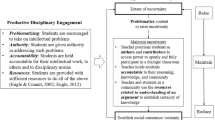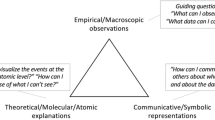Abstract
Sensemaking is conceptualized as a trajectory to develop better understanding and is advocated as one of the fundamental practices in science education. However, the field is lacking of a framework to view the prolonged process of sensemaking that starts from a raise of uncertainty of a target phenomenon to a grasping of a better understanding of a target phenomenon. The process requires teachers to recognize the role of scientific uncertainty in different phases of sensemaking and develop responsive instructional supports to help students navigate the uncertainties. With an attention on student scientific uncertainty as a potential driver of the trajectory of sensemaking, this study aims to identify different phases of sensemaking that can be developed with students’ scientific uncertainty. This study especially attends to two types of scientific uncertainty—conceptual and epistemic uncertainties. Conceptual uncertainty refers to student struggle of using conceptual understanding (e.g., mastery of content and everyday knowledge) to respond to an encountered phenomenon. Epistemic uncertainty emerges from struggles in using epistemic understanding to generate new ideas. Based on the multiple case study method, we examined sensemaking activities in two Korean science classrooms and one American science classroom and identified three phases of sensemaking: (a) focusing on a driving question related to a target phenomenon, (b) delving into multiple resources to develop plausible explanation(s), and (c) examining the successfulness of the new understanding and concretizing it. Based on the findings, we discuss two emerging themes. First, sensemaking progresses through three distinctive phases driven by students’ dynamically evolving scientific uncertainty. Second, attending to both epistemic and conceptual uncertainties can support developing sensemaking coherent with students’ view.





Similar content being viewed by others
References
Ancona, D. (2012). Sensemaking: Framing and acting in the unknown. In S. Snook, N. Nohria, & R. Khurana (Eds.), The handbook for teaching leadership: Knowing, doing, and being (pp. 3–21). Sage Publications.
Beven, K. (2016). Facets of uncertainty: Epistemic uncertainty, non-stationarity, likelihood, hypothesis testing, and communication. Hydrological Sciences Journal, 61(8), 1652–1665.
Brown, A. D., Colville, I., & Pye, A. (2015). Making sense of sensemaking in organization studies. Organization Studies, 36(2), 265–277.
Cannady, M. A., Vincent-Ruz, P., Chung, J. M., & Schunn, C. D. (2019). Scientific sensemaking supports science content learning across disciplines and instructional contexts. Contemporary Educational Psychology, 59, 101802.
Chakravartty, A. (2017). Knowledge under ontological uncertainty. In A. Chakravartty (Ed.), Scientific ontology: Integrating naturalized metaphysics and voluntarist epistemology (pp. 167–200). Oxford University Press.
Chen, Y. -C. (2020). Dialogic pathways to manage uncertainty for productive engagement in scientific argumentation. Science & Education, 29, 331–375.
Chen, Y. -C. (2022). Epistemic uncertainty and the support of productive struggle during scientific modeling for knowldge co-development. Journal of Research in Science Teaching. 59(3), 383–422.
Chen, Y. -C., & Qiao, X. (2020). Using students' epistemic uncertainty as a pedagogical resource to develop knowledge in argumentation. International Journal of Science Education, 42(13), 2145–2180.
Chen, Y. -C., Benus, M. J., & Hernandez, J. (2019). Managing uncertainty in scientific argumentation. Science Education, 103(5), 1235–1276.
Chen, Y. -C., & Techawitthayachinda, R. (2021). Developing deep learning in science classrooms: Tactics to manage epistemic uncertainty during whole-class discussion. Journal of Research in Science Teaching, 58(8), 1083–1116.
Cho, H., Ha, H., & Kim, H. -B. (2019). Exploring the role of collaborative reflection in small group argumentation: Focus on students' epistemic considerations and practices. Journal of the Korean Association for Science Education, 39(1), 1–12.
Conlin, L. D. (2013). Three views of an Aha! moment: Comparing tutorial groups' affective responses to a moment of sudden conceptual insight. Poster Presentation at 2013 Physics Education Research Conference. Portland, OR.
Engle, R. A., & Conant, F. R. (2002). Guiding principles for fostering productive disciplinary engagement: Explaining an emergent argument in a community of learners classroom. Cognition and Instruction, 20(4), 399–483.
Finkelstein, C., Jaber, L. Z., & Dini, V. (2019). “Do I feel threatened? No… I’m learning!” –affective and relational dynamics in science professional development. Science Education, 103(2), 338–361.
Flood, V. J., Amar, F. G., Nemirovsky, R., Harrer, B. W., Bruce, M. R. M., & Wittmann, M. C. (2015). Paying attention to gesture when students talk chemistry: Interactional resources for responsive teaching. Journal of Chemical Education, 92(1), 11–22.
Ford, M. J., & Wargo, B. M. (2012). Dialogic framing of scientific content for conceptual and epistemic understanding. Science Education, 96(3), 369–391.
Furberg, A., & Silseth, K. (2022). Invoking student resources in whole-class conversations in science education: A sociocultural perspective. Journal of the Learning Sciences, 31(2), 278–316.
Gooding, J., & Metz, B. (2011). From misconceptions to conceptual change. The Science Teacher, 78(4), 34–37.
Ha, H., & Choi, Y. (2023). Supporting students' use of ecological concepts in field-based modeling of ecological phenomena. International Journal of Science and Mathematics Education, 21, 2215–2235.
Haverly, C., Barton, A. C., Schwarz, C. V., & Braaten, M. (2020). “Making space”: How novice teachers create opportunities for equitable sense-making in elementary science. Journal of Teacher Education, 71(1), 63–79.
Jordan, M. E., & McDaniel, R. R., Jr. (2014). Managing uncertainty during collaborative problem solving in elementary school teams: The role of peer influence in robotics engineering activity. The Journal of the Learning Sciences, 23, 490–536.
Kampourakis, K. (2018). Science and uncertainty. Science & Education, 27, 829–830.
Kampourakis, K., & McCain, K. (2020). Uncertainty: How it makes science advance. Oxford University Press.
Kirch, S. A. (2009). Identifying and resolving uncertainty as a mediated action in science: A comparative analysis of the cultural tools used by scientists and elementary science students at work. Science Education, 94(2), 308–335.
Klein, G., Moon, B., & Hoffman, R. R. (2006). Making sense of sensemaking 1: Alternative perspectives. IEEE Intelligent Systems, 21(4), 70–73.
Lane, D. A., & Maxfield, R. R. (2005). Ontological uncertainty and innovation. Journal of Evolutionary Economics, 15, 3–50.
Lowell, B. R., & Cherbow, K., & McNeill, K. L. (2022). Considering discussion types to support collective sensemaking during a storyline unit. Journal of Research in Science Teaching, 59(2), 195–222.
Manz, E. (2015). Resistance and the development of scientific practice: Designing the mangle into science instruction. Cognition and Instruction, 33(2), 89–124.
Manz, E. (2018). Designing for and analyzing productive uncertainty in science investigations. In J. Kay & R. Luckin (Eds.), Rethinking learning in the digital age: Making the learning sciences count, 13th International Conference of the Learning Sciences (ICLS) 2018, Volume 1. International Society of the Learning Sciences.
Manz, E., & Suárez, E. (2018). Supporting teachers to negotiate uncertainty for science, students, and teaching. Science Education, 102(4), 771–795.
Mercer, N., & Littleton, K. (2007). Dialogue and the development of children’s thinking: A sociocultural approach. Routledge.
Merriam, S. B. (1998). Qualitative research and case study applications in education: Revised and expanded from case study research in education. Jossey-Bass.
Metz, K. E. (2004). Children's understanding of scientific inquiry: Their conceptualization of uncertainty in investigations of their own design. Cognition and instruction, 22(2), 219–290.
National Research Council [NRC] (2012). A framework for K-12 science education: Practices, crosscutting concepts, and core ideas. National Academies Press.
Naumer, C. M., Fisher, K. E., & Dervin, B. (2008). Sense-making: A methodological perspective. In Proceedings of the SIGCHI Conference on Human Factors in Computing Systems (Vol. 8, pp. 506–513). Florence, Italy: SIGCHI.
Odden, T. O. B., & Russ, R. S. (2019). Defining sensemaking: Bringing clarity to a fragmented theoretical construct. Science Education, 103, 187–205.
Organisation for Economic Co-operation and Development [OECD] (2019). PISA 2018 assessment and analytical framework. OECD.
Osborne, J. (2014). Teaching scientific practices: Meeting the challenge of change. Journal of Science Teacher Education, 25, 177–196.
Rapkiewcz, J., Park, J., Chen, Y. -C., & Jordan, M. E. (2023). Student uncertainty as a pedagogical resource [SUPeR]: Using the SUPeR approach to investigate electromagnetic force. Science Scope, 46(7), 24–31.
Reiser, B. J., Novak, M., & McGill, T. A. W. (2017). Coherence from the students’ perspective: Why the vision of the framework for K-12 science requires more than simply “combining” three dimensions of science learning. Paper prepared for the Board on Science Education Workshop “Instructional Materials for the Next Generation Science Standards.”
Reiser, B. J., Novak, M., McGill, T. A. W., & Penuel, W. R. (2021). Storyline units: An instructional model to support coherence from the students’ perspective. Journal of Science Teacher Education, 32(7), 805–829.
Roth, K. J., Garnier, H. E., Chen, C., Lemmens, M., Schwille, K., & Wickler, N. I. Z. (2011). Videobased lesson analysis: Effective science PD for teacher and student learning. Journal of Research in Science Teaching, 48(2), 117–148.
Schwarz, C. V., Passmore, C., & Reiser, B. J. (2017). Helping students make sense of the world: Next generation science and engineering practices. NSTA Press.
Scott, P. H., Mortimer, E. F., & Aguiar, O. G. (2006). The tension between authoritative and dialogic discourse: A fundamental characteristic of meaning making interactions in high school science lessons. Science Education, 90(4), 605–631.
Sensevy, G. (2014). Characterizing teaching effectiveness in the joint action theory in didactics: An exploratory study in primary school. Journal of Curriculum Studies, 46(5), 577–610.
Sikorski, T.-R., & Hammer, D. (2017). Looking for coherence in science curriculum. Science Education, 101, 929–943.
Star, S. L. (1985). Scientific work and uncertainty. Social Studies of Science, 15(3), 391–427.
Tekkumru-Kisa, M., Stein, M. K., & Doyle, W. (2020). Theory and research on tasks revisited: Task as a context for students’ thinking in the era of ambitious reforms in mathematics and science. Educational Researcher, 49(8), 606–617.
Treagust, D. F., & Duit, R. (2008). Conceptual change: A discussion of theretical, methodological and practical challenges for science education. Cultural Studies of Science Education, 3, 297–328.
Warren, B., Ballenger, C., Ogonowski, M., Rosebery, A. S., & Hudicourt-Barnes, J. (2001). Rethinking diversity in learning science: The logic of everyday sense-making. Journal of Research in Science Teaching, 38(5), 529–552.
Watkins, J., & Manz, E. (2022). Characterizing pedagogical decision points in sense-making conversations motivated by scientific uncertainty. Science Education, 106(6), 1408–1441.
Watkins, J., Hammer, D., Radoff, J., Jaber, L. Z., & Phillips, A. M. (2018). Positioning as not-understanding: The value of showing uncertainty for engaging in science. Journal of Research in Science Teaching, 55(4), 573–599.
Acknowledgements
This research was funded by the National Science Foundation (Award # 2100879) to explore teachers' capacity to manage student epistemic uncertainty to support student's productive struggle and the development of conceptual understanding during project-based learning instruction. The opinions expressed herein are our own and not necessarily those of the National Science Foundation.This work was supported by the Ministry of Education of the Republic of Korea and the National Research Foundation of Korea (NRF-2020S1A5B5A16083113).
Author information
Authors and Affiliations
Corresponding author
Ethics declarations
Conflict of Interest
The authors declare no competing interests.
Additional information
Publisher's Note
Springer Nature remains neutral with regard to jurisdictional claims in published maps and institutional affiliations.
Appendices
Appendix 1 Codebook of types of scientific uncertainty
Table 6
Appendix 2 Pedagogical role of student scientific uncertainty — content uncertainty
Table 7
Appendix 3 Pedagogical role of student scientific uncertainty — epistemic uncertainty
Table 8
Rights and permissions
Springer Nature or its licensor (e.g. a society or other partner) holds exclusive rights to this article under a publishing agreement with the author(s) or other rightsholder(s); author self-archiving of the accepted manuscript version of this article is solely governed by the terms of such publishing agreement and applicable law.
About this article
Cite this article
Ha, H., Park, J. & Chen, YC. Conceptualizing Phases of Sensemaking as a Trajectory for Grasping Better Understanding: Coordinating Student Scientific Uncertainty as a Pedagogical Resource. Res Sci Educ 54, 359–391 (2024). https://doi.org/10.1007/s11165-023-10144-3
Accepted:
Published:
Issue Date:
DOI: https://doi.org/10.1007/s11165-023-10144-3




